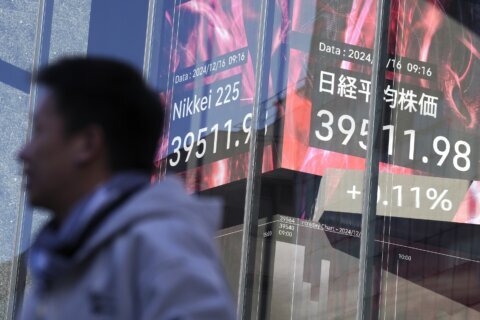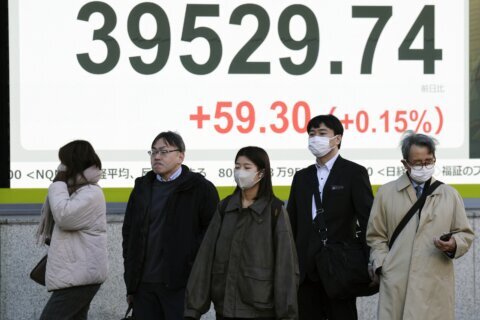JAKARTA, Indonesia (AP) — Indonesia’s president issued a stark warning Thursday after wrapping up a summit of Southeast Asian countries that was joined by China, the United States and Russia, saying “we will be destroyed” unless conflicts are resolved.
The three-day summit by leaders of the Association of Southeast Asian Nations along with Asian and Western counterparts in the Indonesian capital of Jakarta spotlighted major conflicts in Asia with calls for peaceful resolutions and restraint.
Myanmar’s bloody civil strife and the South China Sea territorial disputes, which have dragged on without any solution in sight, figured high on the agenda.
Concerns were also raised over the U.S.-China rivalry in the region, although no ne was specifically called out as Chinese Prime Minister Li Qiang and U.S. Vice President Kamala Harris were in attendance. Russian Foreign Minister Sergey Lavrov also took part.
“I can guarantee you, if we are not able to manage differences, we will be destroyed,” Indonesian President Joko Widodo, who led the 10-nation ASEAN this year, told a news conference after the summit talks.
“If we join the currents of rivalry, we will be destroyed,” he added.
Widodo, who turned over the leadership of the regional group to Laos during the Jakarta meetings, characterized ASEAN as a regional peacemaker — or a safe house — that the world sorely needs.
Founded in 1967 in the Cold War era, the ASEAN groups Brunei, Cambodia, Indonesia, Laos, Malaysia, Myanmar, the Philippines, Singapore, Thailand and Vietnam.
Though long derided as a toothless talkshop, AESAN has been credited for its ability to convene rival world powers in closed-door meetings that provide a chance for dialogue and manage to extract public commitments for peaceful resolution of disputes.
In an ASEAN leaders’ meeting with China, Japan and South Korea in Jakarta, Li underscored the need to oppose “a new Cold War,” although Beijing has long been condemned for its increasingly aggressive actions in the disputed South China Sea and against Taiwan.
“To keep differences under control, what is essential now is to oppose picking sides, bloc confrontation and a new Cold War, and ensure that disagreements and disputes among countries are properly handled,” Li said.
The ASEAN leaders renewed their call for the peaceful resolution of long-seething territorial conflicts in the South China Sea in their post-conference communique, which also welcomed progress in long-delayed negotiations by their regional bloc and China to come up with a nonaggression “code of conduct” to avoid occasional spats from degenerating into a major conflict in the disputed waters.
The contested waters have become a delicate fault line in the U.S.-China rivalry. Washington does not lay any claim to the strategic waterway, a key trade global route, but has deployed its Navy ships and fighter jets to challenge China’s expansive claims and uphold what it calls freedom of navigation and overflight in the offshore region.
U.N. Secretary-General António Guterres, who also met the ASEAN leaders separately on Thursday, renewed an urgent call to the international community to seek a unified strategy to end the worsening crisis in Myanmar.
Declining financial aid should be boosted to previous levels to enable the world body to respond to an “enormous tragedy,” he said and added that the situation in Myanmar has further deteriorated since he met with ASEAN leaders in a 2022 summit.
Guterres again called on the crisis-wracked country’s military-installed government to immediately free all political prisoners and “open the door to a return to democratic rule.”
Myanmar army seized power on Feb. 1, 2021, from the elected government of Aung San Suu Kyi, arresting her and top members of her governing National League for Democracy party, which had won a landslide victory for a new term in a November 2020 general election.
Security forces suppressed widespread opposition to the military takeover with lethal force, killing thousands of civilians and arresting thousands of others who engaged in nonviolent protests. The savage crackdown triggered armed resistance in much of the impoverished country.
Guterres also renewed his alarm over other issues being aggravated by rivalries between and among major powers.
“Our world is stretched to the breaking point by a cascade of crises: from the worsening climate emergency and escalating wars and conflicts, to growing poverty, widening inequalities and rising geopolitical tensions,” Guterres said.
___ Associated Press writer Niniek Karmini in Jakarta, Indonesia, contributed to this report.
Copyright © 2024 The Associated Press. All rights reserved. This material may not be published, broadcast, written or redistributed.







